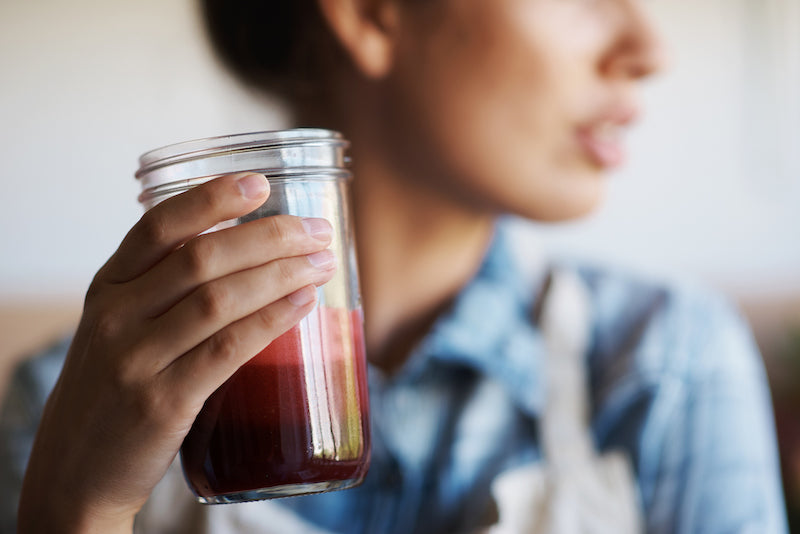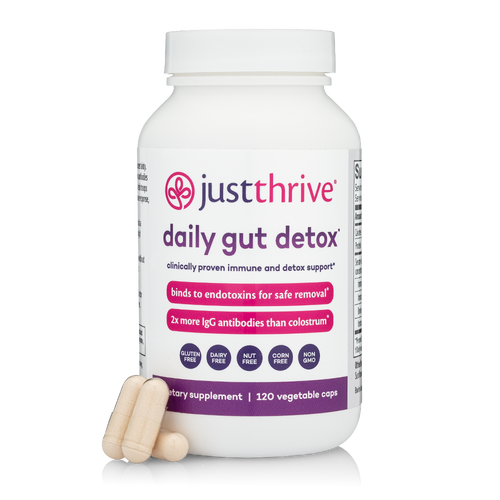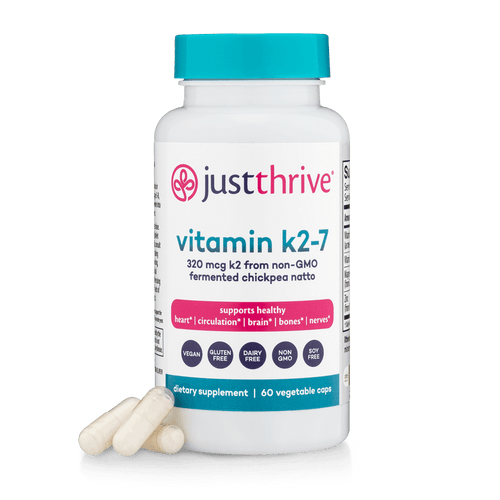And what to do to promote peak wellness (and gut health) instead.
Juice cleanses have grown enormously in popularity, thanks to Instagram influencers and Tick Tock stars. They promise quick results for weight loss, detox, clear skin, and improved immunity.
The problem: They don’t work. And they can actually harm your health, doing the exact opposite of what you were trying to accomplish. Juice cleanses can take a toll on your overall wellness, mainly because they’re terrible for your gut microbiome—the trillions of bacteria in your gut.
Fortunately, there is a way to accomplish your health goals without putting yourself at risk, and it definitely doesn’t involve consuming nothing but juice.
But first, let’s look at how juice cleanses can be detrimental to your overall health…
5 Ways Juice Cleanses Can Damage Your Health
Juice cleanses involve consuming almost nothing but fruit and vegetable juices for anywhere from 1 to 10 days. People rely on juice cleanses for a variety of reasons like losing weight, clearing toxins, boosting nutrients, and improving digestion. But contrary to what you may have heard, juice cleanses can’t accomplish any of these goals… at least not for the long haul. And in many cases, they can actually cause the problems you’re trying to solve.

Evidence suggests that juice cleanses can cause or contribute to the following five issues.
1. Dangerous Blood Sugar Spikes
Juiced fruits and vegetables—even 100% pure juice—contain high amounts of sugar without any fiber to balance the absorption. A single 8-ounce glass of juice contains anywhere from 23 to 28 grams of sugar, practically a full day’s recommended allowance. Drinking juice without anything else for days can lead to big spikes in blood sugar levels, and even lead to type 2 diabetes.[1]
2. Weight Gain
Skipping fiber, fat, and protein while you’re on a juice cleanse can leave you feeling hungry, so you consume more juice. Even 100% fruit juice is packed with calories, all from sugar. Research shows that drinking juice regularly can lead to long-term weight gain.[2]
3. Nutrient Malabsorption
Many nutrients and other healthful compounds like antioxidants can’t be processed in your body without fiber or fat. For example, vitamin A is a fat-soluble vitamin and must be consumed along with healthy fats or your body can’t absorb it.[3] And many antioxidants rely on fiber for their complete absorption.[4] Without fat and fiber, your body won’t be able to make use of the nutrients in the juice.
4. Gut Microbiome Imbalances
Your gut contains trillions of bacteria. When it’s in healthy balance, beneficial probiotic bacteria vastly outnumber harmful pathogens. Probiotic bacteria need dietary fiber to survive and thrive. Pathogens consume sugar. When you drink nothing but juice for even one day, you’re feeding pathogens while starving probiotic bacteria.[5] That gives the pathogens a chance to take over and crowd out probiotics, leading an imbalanced gut—a condition known as dysbiosis.
5. Diarrhea and Bloating
Juice cleanses can cause digestive symptoms, especially diarrhea and bloating.[6] Fructose, a key sugar in fruits and vegetables, can cause digestive symptoms when your body gets too much of it at once, with nothing to act like a buffer. And while it may seem like diarrhea is “cleaning you out,” it’s really a sign that your digestive system isn’t working properly.
The Role of a Balanced Gut In Overall Wellness
Your gut microbiome is the centerpiece of your health, affecting everything from your immune system to your metabolism to your energy to your mood. When your gut microbiome is in healthy balance, highly diverse beneficial probiotic bacteria make up most of the population. And those probiotic bacteria support your wellness, vitality, and longevity in dozens of ways including:- proper, balanced immune system responses[7]
- healthy weight management[8]
- stable blood sugar levels[9]
- improved digestion and nutrient absorption[10]
- natural detoxification[11]
- positive outlook and calm happy moods[12]
- strong circulation and cardiovascular activity[13]
But when your gut microbiome gets knocked out of balance by something like a juice cleanse, all of those benefits disappear. Harmful pathogenic bacteria take over the gut microbiome, allowing all sorts of issues like diarrhea, bloating, and insomnia to take hold, along with increasing your risk for developing certain diseases.[14][15]

The Right Way to Nourish Your Body For Healthy Microbial Diversity
You want your gut to contain many different strains of probiotic bacteria, leaving barely any room for pathogens. Probiotics and pathogens have very different appetites, so you can nourish the good guys without feeding the bacteria you don’t want around.
The best way to support and nourish a healthy gut microbiome is with a diverse diet of primarily whole foods.[16][17] Whole fruits and vegetables supply prebiotic fiber, a preferred snack of probiotic bacteria. Fermented foods like kimchi, kombucha, and kefir also support a healthy gut microbiome environment. Lean proteins and healthy fats—like avocados and olive oil—round out a gut-healthy diet.
Sometimes, though, your gut microbiome can be affected by other things. A single course of antibiotics, for example, can trigger dysbiosis.[18] So can things like pesticide exposure, food additives, and stress.[19] So it makes sense to proactively support the protection of your gut microbiome with a little something more…
Your Gut Needs Probiotics AND Prebiotics to Stay Balanced
For a well-balanced diverse gut microbiome, the best support comes from a combination of spore probiotics and targeted prebiotics—a special type of fiber preferred by a wide variety of beneficial bacteria.
Spore probiotics suppress unwanted bacteria to create space for a diverse population of probiotic bacteria. One study found that a combination of four spore probiotics—Bacillus indicus HU36™, Bacillus subtilis HU58™, Bacillus coagulans, and Bacillus clausii—increased diversity in the gut microbiome in just three weeks.[20]
Targeted prebiotics nourish those probiotic bacteria so they can grow and flourish. Specific prebiotics such as FOS (fructooligosaccharides), XOS (xylooligosaccharides), and GOS (Galactooligosaccharides) have been shown to increase microbiome diversity in scientific studies.[21]
By supplying your gut microbiome with spore probiotics and prebiotics, you’ll be supporting a healthy, diverse population of beneficial bacteria.
Skip the Juice Cleanse and Count on Just Thrive
You want a healthy immune system… steady weight… toxin removal… and just to feel good overall. A juice cleanse won’t get you there… but a healthy gut microbiome will. When your gut contains a diverse population of primarily beneficial bacteria, you’ll enjoy comfortable digestion and dozens of other health benefits.And you can keep your gut microbiome in great shape with Just Thrive Probiotic & Antioxidant, a clinically studied combination of four proven spore probiotics:
- Bacillus indicus HU36™
- Bacillus subtilis HU58™
- Bacillus coagulans (SC-208)
- Bacillus clausii (SC-109)
And you can help those beneficial bacteria flourish by nourishing them with Just Thrive PREbiotic.
Just Thrive PREbiotic contains an exclusive blend of FOS, GOS, and XOS that ONLY feeds the beneficial bacteria you want in your gut. Just Thrive PREbiotic helps promote populations of desirable probiotic strains for a well-balanced gut.
Don’t torture yourself with a juice cleanse. Enjoy real, lasting health benefits by adding Just Thrive Probiotic & Antioxidant and Just Thrive PREbiotic into your everyday routine.
>> Support your peak wellness with our CORE HEALTH Probiotic & PREbiotic Bundle and SAVE.
And if you’re feeling unsure about trying Just Thrive, we can help with that.
EVERY Just Thrive purchase is covered by our Bottom of the Bottle, 100% money back guarantee.
So you can try the Core Health bundle to see if it works for you… and we’re confident it will.
But if for any reason you don’t feel a difference, simply ask for a full product refund. Any time. Even if it’s been 3 months or 3 years. Even if the bottle is empty! You’ll get your money back any time, no hard feelings.
>> Tap here to try the Core Health bundle RISK FREE, and save 30% on your first month’s subscription with code SUB30.
Sources
- Bazzano LA, Li TY, Joshipura KJ, Hu FB. Intake of fruit, vegetables, and fruit juices and risk of diabetes in women. Diabetes Care. 2008 Jul;31(7):1311-7. doi: 10.2337/dc08-0080. Epub 2008 Apr 4. PMID: 18390796; PMCID: PMC2453647.
- Auerbach BJ, Littman AJ, Krieger J, Young BA, Larson J, Tinker L, Neuhouser ML. Association of 100% fruit juice consumption and 3-year weight change among postmenopausal women in the Women's Health Initiative. Prev Med. 2018 Apr;109:8-10.
- National Research Council (US) Committee on Diet and Health. Diet and Health: Implications for Reducing Chronic Disease Risk. Washington (DC): National Academies Press (US); 1989. 11, Fat-Soluble Vitamins. Available from: https://www.ncbi.nlm.nih.gov/books/NBK218749/
- Palafox-Carlos H, Ayala-Zavala JF, González-Aguilar GA. The role of dietary fiber in the bioaccessibility and bioavailability of fruit and vegetable antioxidants. J Food Sci. 2011 Jan-Feb;76(1):R6-R15. doi: 10.1111/j.1750-3841.2010.01957.x. PMID: 21535705; PMCID: PMC3052441.
- Satokari R. High Intake of Sugar and the Balance between Pro- and Anti-Inflammatory Gut Bacteria. Nutrients. 2020 May 8;12(5):1348. doi: 10.3390/nu12051348. PMID: 32397233; PMCID: PMC7284805.
- Wu HJ, Wu E. The role of gut microbiota in immune homeostasis and autoimmunity. Gut Microbes. 2012 Jan-Feb;3(1):4-14. doi: 10.4161/gmic.19320. Epub 2012 Jan 1. PMID: 22356853; PMCID: PMC3337124.
- Carmody RN, Bisanz JE. Roles of the gut microbiome in weight management. Nat Rev Microbiol. 2023 Aug;21(8):535-550. doi: 10.1038/s41579-023-00888-0. Epub 2023 May 3. PMID: 37138047.
- Gérard C, Vidal H. Impact of Gut Microbiota on Host Glycemic Control. Front Endocrinol (Lausanne). 2019 Jan 30;10:29. doi: 10.3389/fendo.2019.00029. PMID: 30761090; PMCID: PMC6363653.
- DiNicolantonio JJ, Lucan SC. Is fructose malabsorption a cause of irritable bowel syndrome? Med Hypotheses. 2015 Sep;85(3):295-7. doi: 10.1016/j.mehy.2015.05.019. Epub 2015 Jun 2. PMID: 26059250; PMCID: PMC4729202.
- Valdes AM, Walter J, Segal E, Spector TD. Role of the gut microbiota in nutrition and health. BMJ. 2018;361:k2179. doi:10.1136/bmj.k2179
- Claus SP, Guillou H, Ellero-Simatos S. The gut microbiota: a major player in the toxicity of environmental pollutants? NPJ Biofilms Microbiomes. 2016 May 4;2:16003. doi: 10.1038/npjbiofilms.2016.3. Erratum in: NPJ Biofilms Microbiomes. 2017 Jun 22;3:17001. PMID: 28721242; PMCID: PMC5515271.
- Clapp M, Aurora N, Herrera L, Bhatia M, Wilen E, Wakefield S. Gut microbiota's effect on mental health: The gut-brain axis. Clin Pract. 2017 Sep 15;7(4):987. doi: 10.4081/cp.2017.987. PMID: 29071061; PMCID: PMC5641835.
- Masenga, S.K., Hamooya, B., Hangoma, J. et al. Recent advances in modulation of cardiovascular diseases by the gut microbiota. J Hum Hypertens 36, 952–959 (2022). https://doi.org/10.1038/s41371-022-00698-6
- Li Y, Xia S, Jiang X, Feng C, Gong S, Ma J, Fang Z, Yin J, Yin Y. Gut Microbiota and Diarrhea: An Updated Review. Front Cell Infect Microbiol. 2021;11:625210. doi: 10.3389/fcimb.2021.625210.
- Vijay A, Valdes AM. Role of the gut microbiome in chronic diseases: a narrative review. Eur J Clin Nutr. 2022;76(4):489-501. doi: 10.1038/s41430-021-00991-6.
- hang P. Influence of Foods and Nutrition on the Gut Microbiome and Implications for Intestinal Health. Int J Mol Sci. 2022;23(17):9588.
- Heiman ML, Greenway FL. A healthy gastrointestinal microbiome is dependent on dietary diversity. Mol Metab. 2016;5(5):317-320.
- Dahiya D, Nigam PS. Antibiotic-Therapy-Induced Gut Dysbiosis Affecting Gut Microbiota-Brain Axis and Cognition: Restoration by Intake of Probiotics and Synbiotics. Int J Mol Sci. 2023;24(4):3074.
- Hrncir T. Gut Microbiota Dysbiosis: Triggers, Consequences, Diagnostic and Therapeutic Options. Microorganisms. 2022;10(3):578.
- Marzorati M, Van den Abbeele P, Bubeck S, Bayne T, Krishnan K, Young A. Treatment with a spore-based probiotic containing five strains of Bacillus induced changes in the metabolic activity and community composition of the gut microbiota in a SHIME® model of the human gastrointestinal system. Food Res Int. 2021 Nov;149:110676. doi: 10.1016/j.foodres.2021.110676. Epub 2021 Aug 30. PMID: 34600678.
- Lee DH, Seong H, Chang D, et al. Evaluating the prebiotic effect of oligosaccharides on gut microbiome wellness using in vitro fecal fermentation. npj Sci Food. 2023;7:18. https://doi.org/10.1038/s41538-023-00195-1













